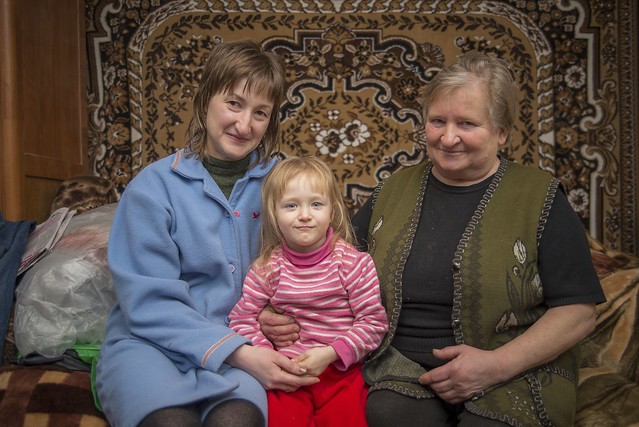The Financing for Development Conference in Addis Ababa in July is the first of three important high-level international meetings that will mark 2015. It will determine the international community’s level of financial commitment (reforms and resources) to combat poverty and inequality over the next 15 years.
It will be followed by adoption of the Post–2015 Development Agenda (including 17 Sustainable Development Goals) in New York in September 2015 and the 21st Session of the Conference of the Parties to the United Nations Framework Convention on Climate Change (COP 21) in Paris in December 2015.
During these meetings, heads of state will have to show their determination to decide the future of our planet and put in place the three pillars of sustainable development: social, economic and environmental.

Caritas teams provided critical humanitarian relief in key areas of the Ukraine, where 1.5 million people have fled their homes as a result of the armed conflict. Photo by Volodymyr Nechaiev for Catholic Relief Services
The ambition that world leaders will show at the Conference on Financing for Development is therefore vital for the success of the subsequent meetings. Without adequate resources for financing for development, the impact of the SDGs and possible agreement in Paris will be limited. Failure in Addis Ababa risks harming the international community’s political will ahead of the other key deadlines in 2015.
Do the world’s states really wish to make the economy and finance serve the full development of all of us and conservation of our natural resources? Will they allow all countries to participate in economic and financial decisions?
Or will states let private actors, who are more concerned about their short-term profits than the common good, to strengthen their grip on the world’s social and economic choices? Will the restricted enclaves reserved for the most powerful be favoured in deciding the fate of the entire world and its future?
Government representatives should go beyond national selfishness and short-term interests if they want to reach a satisfactory agreement to respect the dignity and participation of all states, especially the most fragile ones, and not endanger the discussions on sustainable development and the climate change.
In the preparatory documents, the gap is currently huge between the aimed objectives (a transformative agenda, a changed economic and social model,…) and the proposed solutions (increased room for large companies, international rules defined by the most powerful countries,…).

Caritas Europa urges the European Union and its member states to respect their pledges about social goals agreed upon in 2010, and it actively engages in policy debate on food for deprived and children and family poverty. Photo by Caritas Europa
On the one hand, the rich countries (mostly OECD members) want to appeal to the private sector on a massive scale to finance this agenda via incentives, and favour restricted decision-making spaces they themselves control (OECD, G20, international financial institutions,…) rather than more inclusive spaces (UN).
For example, they currently reject the idea that international tax regulations may be discussed and decided on within a UN framework, preferring the OECD from which the majority of countries are excluded. They therefore cannot assert their needs and expectations in order to be able to adequately mobilise their resources and effectively combat tax evasion. This is also the case with debt problems, an issue currently being dealt with by the Paris Club, which only brings together creditor countries.
For their part, the developing countries (primarily G77 members and China, amounting to 134 countries), supported by civil society organisations, are demanding more inclusive mechanisms within UN frameworks regarding global economic and financial governance.
Countries who want to attract investment will be reluctant to put in place measures to guarantee respect of rights and the environment. Yet it is necessary to ensure that large companies, driven by their quest for large and quick profits, are compelled to respect social, cultural, environmental and fiscal norms to guarantee a real contribution to sustainable development.
There is a concern that the facilities granted to the private sector may lead to an economy dominated by finance with appalling consequences for countries whose banking supervision systems are still fragile. It is finance that should seek to serve achievement of the common good and not the other way round.
Debates clearly reflect the wish of rich countries to merge the Financing for Development policy with the wider Post-2015 Development Agenda. However, this political space centred on financing for Development is currently the only one that enables discussion of the global economic and financial architecture by bringing together the world’s states and stakeholders (the UN, international finance institutions, the private sector, civil society).
Relegating this political process to the rank of sub-section of the Post-2015 Development Agenda amounts to making it gradually disappear to the benefit of not very inclusive frameworks such as the G20, the OECD and IFIs (the IMF and the World Bank).
Caritas Internationalis attaches great importance to the success of this conference at which states should commit themselves to financing the development of poor countries and putting in place fair and inclusive international rules that would enable equitable allocation of resources and prevent the unbridled activities of the private sector and speculative markets from having negative impacts on populations, primarily the most vulnerable ones, and the environment.
For more information, please contact Michelle Hough on +39 06 69879721 / +39 334 2344136 or [email protected].
